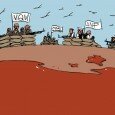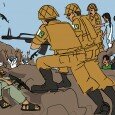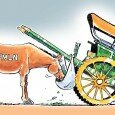The road ahead, full of challenges
Pakistan Muslim League-Nawaz is now in the saddle and election euphoria has already starting to wane. Within days of taking to power, Nawaz Sharif and his team have realized the enormity of challenges that the new government faces. Initial responses have been a bit disconcerting though. The federal budget failed to provide any relief to a population desperate for improvement in their deteriorating and grim lives. Power shortages continue to cripple daily lives and show no signs of abating.
The specter of terrorism stares menacingly at the federal government and has also given the provincial government of Pakistan Tehreek-e-Insaf in Khyber-Pakhtunkwa a reality check. Karachi continues to burn in a vicious circle of ethnic and political violence. The attacks on Jinnah Residencey in Ziarat and killings of nine foreign mountaineers near Nanga Parbat added a new dimension to the terror assault on the country. It would be naïve to assume that these attacks were aimed at just sowing terror.
Highly symbolic, they also carry greater strategic ramifications.Election rhetoric is hard to match in a complicated world of realpolitik and harsh ground realities. Governance in such times of crises will not be a cakewalk. The political government must not hide behind excuses of an inefficient bureaucracy and breakdown of communication within different tiers of the security apparatus. Chaudhry Nisar Ali Khan, the interior minister with a reputation of a tough talking politician, has to match his strong words with strong actions.
We are all aware of the systemic breakdowns and a state of dysfunctionality that pervades through almost every sphere of society. Expressing lament is not the solution. Neither is voicing hollow condemnations over the continuing spate of terror attacks. Government must take steps to thwart terrorist attacks. Evolving a national counter-terrorism strategy would be just a first step.Mr. Sharif will have to act like the statesman he has always aspired to be in order to steer the country out of the current morass.
Apart from building political consensus to grapple with the plethora of challenges, the issue of civil-military relationship will be a test for the new prime minister. Mr. Sharif must ensure civilian supremacy and he has already taken a big step toward this direction by declaring that former President and army chief Pervez Musharraf will be tried for treason. The process of transparent accountability must start but it should not reek of personal vendettas and political point-scoring.
Alarmingly, there are also signs that relations between the top political leadership and the top brass have not gotten off to a smooth start. Any such confrontation would be extremely unfortunate as it could veer the country off the tracks it needs to take.The next few months will witness a transition in the security establishment and the higher judiciary, with the Chief of Army Staff, Chairman Joint Chiefs of Staff Committee and the Chief Justice completing their respective tenures. While their potential successors are most likely to be appointed on the basis of seniority, the Prime Minister will have his final word with regard to the military appointments.
More importantly, the election of a new President after September 9 would bring in someone close to the ruling party. Together, these changes in the country’s highest positions of authority would make Mr. Sharif once again a Prime Minister with unprecedented room to maneuver and make difficult decisions without any hindrance.































































































